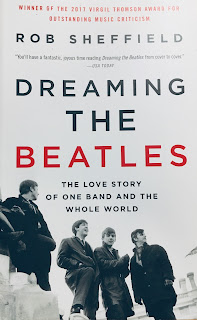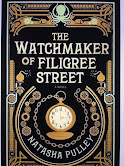Like Dreamers Do: A Review of Dreaming the Beatles
by Theresa Gauthier
Dreaming the Beatles by Rob Sheffield
Reading more Beatles books is a good way to start a new year, and I was truly excited to read this one. I’d heard good things about it. I was aware of it winning an award for music criticism.
Diving in, the first thing I noticed was that this is a writer who can write. I know that sounds like tautology, but I mean it. There are writers who just write, and there are writers who have a way with words and language. Sheffield’s words roll across the page with an ease and fluidity that duplicate conversation. This makes it a quick read, and no doubt is why so many people like it.
I didn’t hate it, but I really didn’t love it.
Admiring the writer’s talent is one thing, and I do, but his opinions, more often than not presented as fact, were irritating, presumptive, and, sometimes, ill-informed. He has no problem with claiming to know what’s in the heads and hearts of each of The Beatles at any given moment. No one knows what these men went through except these four men. It can be presumed that even Ringo only knows what Ringo went through, but Paul is the most likely person to come close to knowing what that was—and vice versa. No one else should attempt to present their own personal opinions of Beatles music—meaning what was going through their minds when they wrote and recorded that music rather than what that music means to the writer—as though it’s absolute fact. It’s opinion. Even if most people share that opinion that doesn’t make it fact.
That’s not the only thing that bothers me about the book. There also seems to be a massive misinterpretation, misrepresentation, or perhaps misunderstanding of the history of the band he claims to love.
Case in point, he claims that George Harrison was the only member of the band to audition. I’m not sure what lead Sheffield to that conclusion. The backstory of The Beatles that I’ve always known starts with John and Paul meeting and, while Paul was trying to impress John, he played ‘Twenty Flight Rock” for him. That could certainly have been construed as an audition. As for Ringo, technically, they heard him play in Hamburg with Rory Storm and the Hurricanes, and hanging out with him, they knew they would all get along. The only reason there wasn’t a formal audition was because it had happened organically.
At another point, Sheffield claims that, “No two boys ever agreed on anything like John and Paul agreed about girls. From their earliest days together, they loved to sing about the sounds girls made. They enjoyed stepping onstage and getting enveloped in those girl sounds.”
How can he claim in any senes to know what John and Paul were thinking when they got up on stage? How can he believe that John and Paul’s mutually love of girls was different from every other boy’s love of girls? Hyperbole aside, I find his presumption irritating at the very least.
His belief that “In any of your relationships you know whether you’re the John or the Paul.”
What? Is this something people do? Is there a generation of Beatles fans who run through life deciding if they’re the John or the Paul in each of their personal relationships? If that’s the case, I hope I never meet these people.
Another troubling passage concerns the statement that The Beatles are far more famous and beloved now (the book was written in 2017) than they were “in their lifespan”—which is at best a befuddling statement and at worst dismisses the entire phenomenon of Beatlemania. What was all that screaming, fainting, chasing, hanging-around-outside-Abbey-Road if it wasn’t an unprecedented illustration of the adoration of the masses? How are we measuring this fame and love? In what way were The Beatles less famous and beloved in 1965 than in 2015?
I know these are nitpicks. I know Sheffield is—or at least claims to be—a fan, but when he gets hung up for a couple of paragraphs complaining about Paul’s 1984 Playboy interview because he was vague and perhaps overly “look on the bright side” about his eight days in a Japanese jail. Sheffield finds this hard to believe. He makes a crack about Paul’s “cute stories about the brighter side of being locked up in a Tokyo prison” and a “commitment to niceness” turning into “the kind of mentality that refuses to remember anything but pleasant memories of prison” to the point that I can’t help but wonder if Sheffield is just trying to be flippant and funny or if he actually believes that Paul is obligated not only to feel the way Sheffield thinks he should but also to share all the details of his hellish experience with the public.
Sheffield refers to the first time he saw The Beatles live revealing that what he saw was Beatlemania with what I assume was either another misguided attempt at humor or a misguided belief that seeing Beatlemania was the same thing.
I’ve seen Beatles cover bands—some of the best Beatles cover bands, but as thrilling as it is to see and hear those songs and imagine that I’m seeing them, it’s nothing like seeing the real Beatles. Paul and Ringo both give better concerts alone than any four piece imitation ensemble can manage.
In his ridiculously titled chapter, “Paul is a Concept by Which We Measure Our Pain” Sheffield makes the bizarre claim that Paul McCartney “is the most Beatlesque of the Beatles,” a statement that makes less and less sense as he tries to define it. He believes that if you don’t like The Beatles it’s because you don’t like Paul, that the band’s flaws are Paul’s flaws, that if The Beatles are overrated it’s because Paul—well you get it. He says Paul is the only Beatle anyone bothers to hate.
Everything admirable about Paul, Sheffield twists into something to despise or at least mistrust. Paul isn’t a saint—who is? Neither is he the demon some fans take him for. He’s a brilliant musician able to create hit songs seemingly without trying. (Yesterday. Picasso’s Last Words.) I have no problem with having either a favorite Beatle or a least favorite, but I find it disheartening that so many people—whether in reality or just for a laugh in the middle of a book—prefer to make Paul seem less. Despise him just for being successful? Dislike him because he put his wife in the band? Buy his music, see his movies, follow his career solely so that you can point out what he’s done wrong? That sort of person is exhausting.
I happen to believe that people who pick on Paul for these reasons are doing it out of jealousy. No one can be mad at Ringo. George and John are dead. That leaves Paul as the sole scapegoat—the one member of the most beloved band in Rock and Roll history that people feel all right about hating. (No, I’m not a Paul girl. I’m a George fan through and through, and yes I found him irritating on Let it Be but I also found that Let it Be was fallible in a way that Peter Jackson’s Get Back was able to excise. So much of what I took for granted about Let it Be disintegrated with the much better Get Back. Not that I think Let it Be deserves to disappear, but that’s an entirely different conversation.)
There were parts of Dreaming the Beatles that were fun to read, and I’m not sorry I read it, but for the most part, I don’t feel it brings much to the panoply of Beatles literature.







Comments
Post a Comment